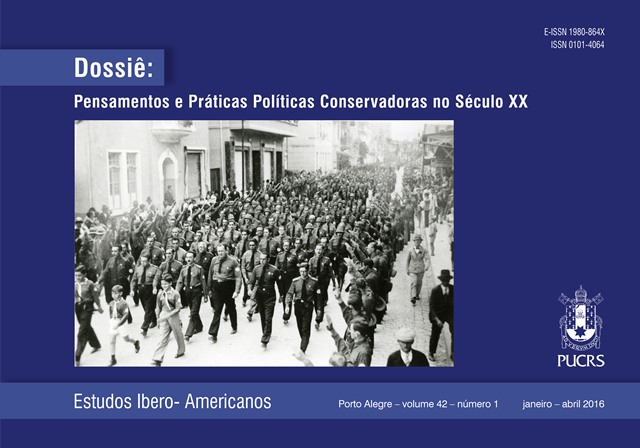“Ver, Juzgar y Actuar”: A Manifesto for the “Conservative Catholic Argentina” (1971)
DOI:
https://doi.org/10.15448/1980-864X.2016.1.21824Keywords:
Tradition, Family and Property (TFP), Ver, Juzgar y Actuar Manifesto, Political conservatism, Anticommunism, ArgentinaAbstract
Aspects of the democratic transition that ended the process of the so-called Argentinean Revolution – military dictatorship from 1966 to 1973 – as understood by the Argentinean Society for the defense of Tradition, Family and Property (TFP) are analyzed in this paper. The association, which was created in 1967 and was dedicated to the catholic anticommunist fight, acted towards the instruction of the public opinion on the Argentinean reality in 1971 by publishing Ver, Juzgar y Actuar, a manifesto in which their thoughts on the country’s broader context and the means for the necessary counterrevolutionary fight were presented. Considering that the changes brought by General Lanusse’s government (1971-1973) would lead the country to Communism, TFP urges Argentinean Catholics to oppose to the process through clarification and effective doctrinarian action. Based on a conservative political culture, the entity appeals to the defense of order, moral and “authentic” progress in conformity with Christian traditions as part of the entity’s broader struggle against the traits of modernity, particularly those identified with progressivism, leftism, liberalism and contemporary immorality.
Downloads
References
AMÉZOLA, Gonzalo de. Lanusse o el arte de lo imposible. El lanzamiento del GAN (marzo-mayo de 1971). Cuadernos del CISH, n. 2-3, p. 183 238, 1997.
______. Las vísperas del Gran Acuerdo Nacional. Militares y políticos apuestan al futuro a fines de 1970. Trabajos y Comunicaciones, n. 26 27, p. 249-287, 2000-2001.
BETT, Ianko. A (re)invenção do Comunismo: discurso anticomunista católico nas grandes imprensas brasileira e argentina no contexto dos golpes militares (1964 e 1966). Dissertação (Mestrado em História) – UNISINOS, São Leopoldo, 2010.
DALMAZZO, Gustavo. El tradicionalismo ante la apertura política en la Revolución Argentina. IV Encuentro de Profesores de Historia del Nordeste y IV Jornadas Nacionales de Historia Moderna y Contemporánea, 2004. p. 7.
DÍAZ, María Fernanda. El Gran Acuerdo Nacional en La Nación, 1971 1972. Universidad Nacional de La Plata. s.d. Disponível em: <http://www.perio.unlp.edu.ar/ >. Acesso em: 16 nov. 2013.
GIRBAL-BLACHA, Noemí; ZARRILLI, Adrián Gustavo; BALSA, Juan Javier. Estado, sociedad y economía en la Argentina (1930-1997). Bernal: Universidad Nacional de Quilmes, 2001.
MALLIMACI, Fortunato. El catolicismo integral en la Argentina (1930-1946). Buenos Aires: Editorial Biblos, 1988.
OLIVEIRA, Plínio Corrêa de. Revolução e Contra-Revolução. São Paulo: Artpress, 1993.
RUDERER, Stephan. Cruzada contra El comunismo. Tradición, Familia y Propiedad (TFP) en Chile y Argentina. Sociedad y Religion, n. 38, p. 79 108, 2012.
SCIRICA, Elena. Grupos laicales tradicionalistas contra los sectores tercermundistas. Una aproximación a sus prácticas y estrategias de difusión. In: FOGELMAN, Patrícia; DE LUCA, Candela (Comp.). Actas electrónicas del Cuarto Simposio Internacional sobre Religiosidad, Cultura y Poder. (IV SIRCP) de GERE. Buenos Aires: GERE, Ed. de la FFyL UBA, 2012.
Downloads
Published
How to Cite
Issue
Section
License
Copyright
The submission of originals to Estudos Ibero-Americanos implies the transfer by the authors of the right for publication. Authors retain copyright and grant the journal right of first publication. If the authors wish to include the same data into another publication, they must cite Estudos Ibero-Americanos as the site of original publication.
Creative Commons License
Except where otherwise specified, material published in this journal is licensed under a Creative Commons Attribution 4.0 International license, which allows unrestricted use, distribution and reproduction in any medium, provided the original publication is correctly cited.






